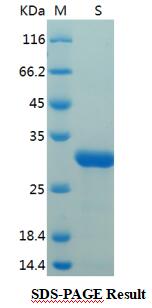Product Name :
CD119 Recombinant Protein Swiss-Prot :
P15260 Host :
E.coli Tag :
≥0.5mg/ml Amino acid Sequence :
EMGTADLGPSSVPTPTNVTIESYNMNPIVYWEYQIMPQVPVFTVEVKNYGVKNSEWIDACINISHHYCNISDHVGDPSNSLWVRVKARVGQKESAYAKSEEFAVCRDGKIGPPKLDIRKEEKQIMIDIFHPSVFVNGDEQEVDYDPETTCYIRVYNVYVRMNGSEIQYKILTQKEDDCDEIQCQLAIPVSSLNSQYCVSAEGVLHVWGVTTEKSKEVCITIFNSSIKG Restriction sites :
NdeI-XhoI Background :
IFN-γ plays key roles in both the innate and adaptive immune response. IFN-γ activates the cytotoxic activity of innate immune cells, such as macrophages and NK cells. IFN-γ production by NK cells and antigen presenting cells (APCs) promotes cell-mediated adaptive immunity by inducing IFN-γ production by T lymphocytes, increasing class I and class II MHC expression, and enhancing peptide antigen presentation. The anti-viral activity of IFN-γ is due to its induction of PKR and other regulatory proteins. Binding of IFN-γ to the IFNGR1/IFNGR2 complex promotes dimerization of the receptor complexes to form the (IFNGR1/IFNGR2)2 -IFN-γ dimer. Binding induces a conformational change in receptor intracellular domains and signaling involves Jak1, Jak2, and Stat1. The critical role of IFN-γ in amplification of immune surveillance and function is supported by increased susceptibility to pathogen infection by IFN-γ or IFNGR knockout mice and in humans with inactivating mutations in IFNGR1 or IFNGR2. IFN-γ also appears to have a role in atherosclerosis. Soluble :
PBS, 4M Urea, PH7.4 Purification&Purity :
Transferred into competent cells and the supernatant was purified by NI column affinity chromatography and the purity is > 85% (by SDS-PAGE). Storage&Stability :
Store at 4°C short term. Aliquot and store at -20°C long term. Avoid freeze-thaw cycles. Expression vector :
pet-22b(+) BiowMW :
~25kDa Note :
For research use only, not for use in diagnostic procedure. concentration :
≥0.5mg/ml
CD119 Recombinant Protein Swiss-Prot :
P15260 Host :
E.coli Tag :
≥0.5mg/ml Amino acid Sequence :
EMGTADLGPSSVPTPTNVTIESYNMNPIVYWEYQIMPQVPVFTVEVKNYGVKNSEWIDACINISHHYCNISDHVGDPSNSLWVRVKARVGQKESAYAKSEEFAVCRDGKIGPPKLDIRKEEKQIMIDIFHPSVFVNGDEQEVDYDPETTCYIRVYNVYVRMNGSEIQYKILTQKEDDCDEIQCQLAIPVSSLNSQYCVSAEGVLHVWGVTTEKSKEVCITIFNSSIKG Restriction sites :
NdeI-XhoI Background :
IFN-γ plays key roles in both the innate and adaptive immune response. IFN-γ activates the cytotoxic activity of innate immune cells, such as macrophages and NK cells. IFN-γ production by NK cells and antigen presenting cells (APCs) promotes cell-mediated adaptive immunity by inducing IFN-γ production by T lymphocytes, increasing class I and class II MHC expression, and enhancing peptide antigen presentation. The anti-viral activity of IFN-γ is due to its induction of PKR and other regulatory proteins. Binding of IFN-γ to the IFNGR1/IFNGR2 complex promotes dimerization of the receptor complexes to form the (IFNGR1/IFNGR2)2 -IFN-γ dimer. Binding induces a conformational change in receptor intracellular domains and signaling involves Jak1, Jak2, and Stat1. The critical role of IFN-γ in amplification of immune surveillance and function is supported by increased susceptibility to pathogen infection by IFN-γ or IFNGR knockout mice and in humans with inactivating mutations in IFNGR1 or IFNGR2. IFN-γ also appears to have a role in atherosclerosis. Soluble :
PBS, 4M Urea, PH7.4 Purification&Purity :
Transferred into competent cells and the supernatant was purified by NI column affinity chromatography and the purity is > 85% (by SDS-PAGE). Storage&Stability :
Store at 4°C short term. Aliquot and store at -20°C long term. Avoid freeze-thaw cycles. Expression vector :
pet-22b(+) BiowMW :
~25kDa Note :
For research use only, not for use in diagnostic procedure. concentration :
≥0.5mg/ml
Blocking peptide available as NCP0255P

 CD119 Recombinant Protein
CD119 Recombinant Protein 
 Datasheet
Datasheet COA
COA MSDS
MSDS SHIP
SHIP